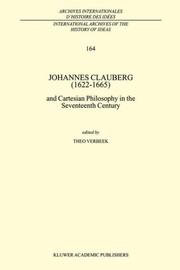| Listing 1 - 7 of 7 |
Sort by
|
Book
Year: 1731 Publisher: Amstelaedami : apud Janssonio-Waesbergios,
Abstract | Keywords | Export | Availability | Bookmark
 Loading...
Loading...Choose an application
- Reference Manager
- EndNote
- RefWorks (Direct export to RefWorks)
Book
Year: 1703 Publisher: Amstelaedami : apud Janssonio-Waesbergios,
Abstract | Keywords | Export | Availability | Bookmark
 Loading...
Loading...Choose an application
- Reference Manager
- EndNote
- RefWorks (Direct export to RefWorks)
Book
Year: 1712 Publisher: Amstelaedami : apud Janssonio-Waesbergios,
Abstract | Keywords | Export | Availability | Bookmark
 Loading...
Loading...Choose an application
- Reference Manager
- EndNote
- RefWorks (Direct export to RefWorks)
Book
Year: 1891 Publisher: Jena : Frommannsche Buchdruckerei H. Pohle,
Abstract | Keywords | Export | Availability | Bookmark
 Loading...
Loading...Choose an application
- Reference Manager
- EndNote
- RefWorks (Direct export to RefWorks)
Clauberg, Johann, --- Clauberg, Johann, --- Descartes, René, --- Descartes, René,
Book
Year: 2011 Publisher: Paris : Vrin,
Abstract | Keywords | Export | Availability | Bookmark
 Loading...
Loading...Choose an application
- Reference Manager
- EndNote
- RefWorks (Direct export to RefWorks)
La pensée de Johann Clauberg se situe à l'intersection de trois axes « majeurs » de la philosophie moderne : le cartésianisme, l'ontologie et l'herméneutique. Trois lignes de force qui apparaissent dans la première moitié du XVIIe siècle et qui s'accentuent jusqu'à la fin du XVIIIe siècle. La philosophie de Clauberg ne s'épuise donc pas dans la seule interprétation de la philosophie cartésienne, dont elle oriente la lecture jusqu'au XXe siècle, mais elle offre également une perspective privilégiée pour comprendre quelques-uns des enjeux philosophiques essentiels du Grand Siècle. Si l'adhésion au cartésianisme est motivée par des problématiques internes au mouvement de réforme de la métaphysique qui se produit dans la Schulmetaphysik, la constitution de la première logique cartésienne, la Logica vetus et nova - qui est aussi la première logique herméneutique - est le fruit principal de cette rencontre entre la methodus cartesiana et l'ontologie.
Ontology --- Metaphysics --- History. --- History. --- Descartes, René, --- Clauberg, Johann,

ISBN: 0792358317 9048152690 9401592373 9780792358312 Year: 1999 Volume: 164 Publisher: Dordrecht ; Norwell, MA : Kluwer,
Abstract | Keywords | Export | Availability | Bookmark
 Loading...
Loading...Choose an application
- Reference Manager
- EndNote
- RefWorks (Direct export to RefWorks)
In this book twelve outstanding historians of early modern philosophy undertake a study of the philosophy of Johannes Clauberg (1622-1665). Clauberg was not only among the first followers of Descartes (whose philosophy he taught from 1650 in Herborn and from 1652 until the end of his life in Duisburg) but also assured its survival as an academic philosophy by giving it a more traditional and more didactic expression. A first group of articles deals with Clauberg's early metaphysics as it found its expression in his Ontosophia of 1646 (republished with very considerable changes in 1664), the way it was influenced by Comenius (Leinsle), its relation to Malebranche (Bardout) and Wolff (École) and the way in which it illustrates the difficulties of a Cartesian ontology in general (Carraud). A second group of articles deals with problems of knowledge: knowledge of God (Goudriaan), perceptual knowledge (Spruit) and causality (Pätzold). There are also articles on Clauberg's curious attempt to deal philosophically with the etymology of the German language (Weber), Clauberg as a teacher of Descartes' Principia (Verbeek), Clauberg's conception of corporeal substance (Mercer), and Clauberg's relation to later, more radical developments in Cartesian philosophy, especially in Lodewijk Meyer (Albrecht). The volume is completed by a biographical introduction and a short title bibliography of Clauberg's works, which allows an appreciation of Clauberg's lasting international influence. It is the first study on this scale of one of the most influential philosophers of the seventeenth century.
Clauberg, Johann, --- Descartes, René, --- Descartes, René --- Claubergius, Joh. --- Claubergius, Johannes, --- Clauberg, Johannes, --- Descartes, Renatus --- Cartesius, Renatus --- Clauberg, Johannes --- Influence --- Philosophy [Modern ] --- 17th century --- Philosophy. --- Religion. --- History. --- Philosophy, general. --- Religious Studies, general. --- History, general. --- Annals --- Auxiliary sciences of history --- Religion, Primitive --- Atheism --- Irreligion --- Religions --- Theology --- Mental philosophy --- Humanities --- Cartésianisme --- Cartésianisme --- Clauberg, Johann, - 1622-1665 - Congresses --- Descartes, René, - 1596-1650 - Congresses --- Clauberg, Johann, - 1622-1665 --- Descartes, René, - 1596-1650 --- Clauberg (johanes), 1622-1665
Book
ISBN: 9782711623730 2711623734 Year: 2011 Publisher: Paris : J. Vrin,
Abstract | Keywords | Export | Availability | Bookmark
 Loading...
Loading...Choose an application
- Reference Manager
- EndNote
- RefWorks (Direct export to RefWorks)
La pensée de Johannes Clauberg se situe à l'intersection de trois axes "majeurs" de la philosophie moderne: le cartésianisme, l'ontologie et l'herméneutique. Trois lignes de force qui apparaissent dans la première moitié du XVIIe siècle et qui s'accentuent jusqu'à la fin du XVIIIe siècle. La philosophie de Clauberg ne s'épuise donc pas dans la seule interprétation de la philosophie cartésienne, dont elle oriente la lecture jusqu'au XXe siècle, mais elle offre également une perspective privilégiée pour comprendre quelques-uns des enjeux philosophiques essentiels du Grand Siècle. Si l'adhésion au cartésianisme est motivée par des problématiques internes au mouvement de réforme de la métaphysique qui se produit dans la Schulmetaphysik, la constitution de la première logique cartésienne, la Logica vetus et nova, qui est aussi la première logique herméneutique, est le fruit principal de cette rencontre entre la methodus cartesiana et l'ontologie.
Clauberg, Johannes --- Ontology. --- Metaphysics. --- Philosophy, Modern --- Ontologie --- Métaphysique --- Philosophie --- Clauberg, Johann, --- Descartes, René, --- Ontologie. --- Métaphysique. --- Cartésianisme --- Métaphysique --- Descartes, René, --- Cartésianisme. --- Métaphysique. --- Cartésianisme. --- Descartes, René
| Listing 1 - 7 of 7 |
Sort by
|

 Search
Search Feedback
Feedback About UniCat
About UniCat  Help
Help News
News